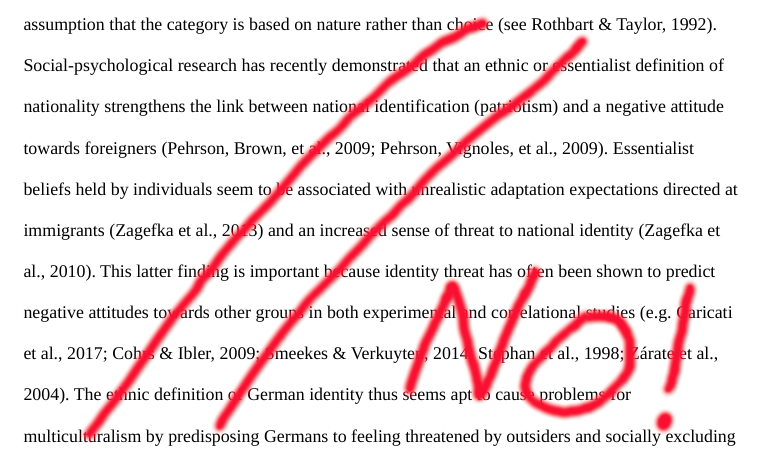Have you ever received feedback for one of your assignments but still don’t understand how to improve? Then read the following blog post written by psychology lecturer Dr Dennis Nigbur, which was originally published here on his blog.
With now over 20 years’ experience in marking and moderating psychology coursework at BSc and MSc levels, I’ve noticed that the same misunderstandings between markers and candidates come up time and time again. Since I have a bit of an obsession with (or let’s more positively call it a passion for) feedback, of course I do point these out to markers whose work I moderate. But there are loads of markers, so these issues aren’t going away anytime soon. So if you’re a student and sometimes feel that you need a marker/student dictionary, this blog post may be of interest. If you’re a marker and want to build some awareness of these jargon-induced misunderstandings, good on you! Let’s do some jargon busting!
1. “Use more recent sources”
Sometimes closely followed by something like “Cite the original source of this idea” to make it extra confusing. What would be the point in teaching classics such as Piaget in developmental or Asch in social psychology only for markers then to be preoccupied with recent sources? Well, what the marker actually means here is that you can demonstrate more knowledge of the literature (usually one of the most important grading criteria) by showing that you have an overview of who has critiqued, replicated, expanded or otherwise meaningfully engaged with the earlier sources you cited. The marker isn’t asking you to ditch the classics, but to show – additionally – your awareness of what has happened since. This can also help your work in other ways. For example, an awareness of recent re-evaluations of Milgram’s work on “obedience” (I may blog separately about this at some point, but for now I’ll just cite Gibson, 2019, as an example) may allow you to demonstrate critical reasoning – another important grading criterion – by highlighting and evaluating this debate if (!) it’s relevant to your assessment task.
2. “Too descriptive”
This is one of my favourite bugbears. I believe it may be almost impossible for students to understand – at least for those who have been “too descriptive” in the first place. Bizarrely, this markers’ jargon has established itself although it doesn’t actually say what’s wrong with the work or how it could be improved. After all, being descriptive is a good thing most of the time: Describing a theory, study or problem well is a crucial skill and will earn you a fair few marks. So the marker isn’t actually asking you to be less descriptive, but more interpretative, critical, or analytical in some way. In other words, what’s missing from your writing is an intellectual effort that goes beyond description – but what’s missing from the “too descriptive” comment is any clear indication of what that is. I’ve jokingly compared this to saying “Nice shirt!” when you actually mean “You have no trousers on.”

2 and a half. “Be more critical”
While we’re on the subject: Being critical obviously doesn’t mean saying as many negative things as possible. All students understand that writing something like “This paper is a big steaming pile of dung because …” is not good! When a marker tells you to be more critical, what they mean is that you could do one or several of the following:
- comparing and contrasting different theoretical approaches, studies, or methods
- showing awareness of what an individual study or a whole evidence base does and doesn’t show – which includes finding gaps in the literature and demonstrating an appreciation of the limits of current knowledge
- showing awareness of the links between epistemologies, methods and conclusions – the most popular example perhaps being that correlation doesn’t imply causality (Why do shoe size and IQ correlate in children?)
- offering a critique of theory or studies with a view to how current or future work could improve or build on them
- applying academic literature to a new context in professional practice or everyday life
There are some good books with explanations and exercises about critical reasoning, for example Forshaw (2012). In general terms, you will notice that all of the above clearly go beyond saying what a theory or piece of evidence is and instead elaborate on what it means, what it implies, and how it can be evaluated or used. In other words – dare I say it? – it’s going beyond description.
3. “Don’t use the first person”
Except that many published papers do (“We found that …”), and that the APA style followed by psychology authors around the world explicitly provides for the use of the first person. It’s on page 120 of the current publication manual (American Psychological Association, 2019) if you want to look it up. Again, the markers’ jargon doesn’t pinpoint the actual problem. In many conversations with many markers, I’ve basically encountered two separate but related lines of reasoning. The first is that there’s a long but essentially outdated tradition of regarding the use of the passive voice (“Participants were administered a questionnaire. Data were subjected to a multiple linear regression analysis.”) as somehow more scientific. Although I can’t find the source right now, I’m sure I read that the APA itself rejected this view many years ago because the passive voice tends to produce awkward and unclear sentences, and obscures the active role of researchers in their research. The second, separate but related, argument is that the use of the first person can accidentally lead to an inappropriately informal writing style. It sets a trap for writers by tempting them – through habit and familiarity – into an opinion-piece or stream-of-consciousness style (“I think this, I believe that”) rather than a critical academic style. So the issue often isn’t really about the use of the first person specifically (although it’s worth checking your marker’s views on the topic in advance if you can), but about a more generally unsuitable writing style.
4. “Reference”
This is almost always good advice, but can mean so many things. I’m including it here because students sometimes come to me saying that the feedback on their work was mostly about the referencing – which creates the impression that some evil marker docked an evil amount of marks for, essentially, format issues. This is an unhelpful way of thinking. Yes, markers sometimes do make a lot of comments on formal aspects, basically because formal weaknesses – including weaknesses in referencing – tend to be clear-cut, easily remedied, and useful to address if you want to develop your general writing skills beyond this particular piece of work. These formal aspects usually make up only a small proportion of the mark, and I do sometimes remind markers to offer more feedback on the more substantial aspects such as knowledge and critical reasoning. Still, formal writing – including good referencing – is a crucial skill for students in psychology and many other disciplines, and it’s usually worth looking carefully at what the marker might have meant when feeding back on the referencing. Should you have inserted more citations in the text, to acknowledge your sources properly and demonstrate knowledge of the literature? Is there a detail in the format of your citations or reference list that needs fixing? Is your reference list (or bibliography) incomplete or untidy? Is there information missing about individual references, which makes them difficult or impossible to trace (when making sources traceable is the whole point of referencing)? Critically asking these questions of your own referencing will help you figure out what the marker meant.

5. “Good”
This comment – or the traditional handwritten tick, now threatened with extinction in the age of online marking – is genuinely meant as praise, but can still be unhelpful. My friend and academic colleague David still talks, decades after the fact, about how upset he was when he received one of his undergraduate essays back from the marker, with a mark of 68 and the one-word comment “Good”! What was good, and therefore worth cultivating into the future? What would have been needed for a 70 or 72, and thereby a higher grade band? Being constructive doesn’t just mean being positive, but also being clear about what’s worth keeping and what’s worth improving. As a reality check, it’s worth remembering that markers don’t have time to spell all this out in detail. Where I work, our workload allocations currently allow 30 minutes to mark 2000 words … as a temporary measure, until we go down to 20 minutes per 2000 words! So you’ll have to examine in what context the marker inserted the “good” comment if you want to understand what exactly was considered good. An active engagement with the feedback is always a good idea. And, reassuringly, markers don’t get away with one-word comments on a whole essay any more.
References
American Psychological Association. (2019). Publication manual of the American Psychological Association (7th ed.). American Psychological Association.
Forshaw, M. (2012). Critical thinking for psychology: A student guide. Wiley.
Gibson, S. (2019). Obedience without orders: Expanding social psychology’s conception of ‘obedience’. British Journal of Social Psychology, 58(1), 241–259. https://doi.org/10.1111/bjso.12272
 psychology
psychology Amanda Diserholt
Amanda Diserholt 2662
2662


